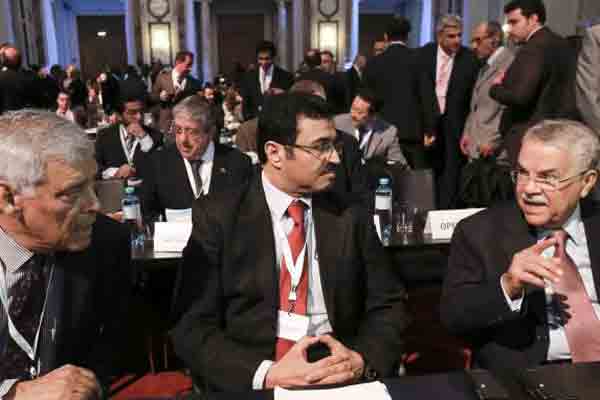
Saudi Arabian Oil Minister Ali Al-Naimi (centre), Qatar's Minister of Energy and Industry Mohammed Saleh Al-Sada (right) and Opec Secretary-General Ab
Opec to continue pumping oil at current rate
VIENNA, June 3, 2015
The Organization of the Petroleum Exporting Countries (Opec) is set to carry on pumping oil nearly flat-out for months more, content that last year's shock market therapy has revived demand and knocked back growing competition.
With oil prices having stabilised, at around $65 a barrel, some $20 above their January lows, there's little appetite within the Opec to modify production limits.
"There is consensus among Gulf Opec c countries, and others, to keep the ceiling unchanged," a senior Gulf Opec delegate told Reuters latey after an informal meeting of the four core Gulf Arab Opec members earlier in the day.
Iraqi oil minister Adel Abdel Mahdi said there was "optimism and general acceptance with the current situation".
The group meets on Friday following a two-day seminar featuring the chief executives of the world's biggest energy groups, including BP and Exxon, companies whose fortunes have been abruptly altered by Opec's decision to abandon efforts aimed at sustaining oil prices at more than $100 a barrel in favour of defending market share.
"Nobody wants to rock the boat," the Gulf source said. "The meeting is expected to be smooth sailing."
Opec Secretary-General Abdullah Al Badri said that it would likely be a brief meeting. "Everything is very clear."
That marks a change in tone from Opec's last meeting in November 2014, when Venezuela and others mounted an unsuccessful bid to convince Saudi Arabia and its Gulf allies to tighten the taps on supply.
Instead, the kingdom laid out its new laissez faire approach, saying it will no longer consider cutting output without the cooperation of non-Opec producers such as Russia.
This time calls for collaboration have been muted.
The Gulf source said the outlook for the oil market is positive, especially in the second half of this year, which Qatar's oil minister Mohammed Al-Sada said should be "more balanced".
"You can see that I'm not stressed, I'm happy," Saudi oil minister Ali Al-Naimi said.
IRAN'S RETURN
There may still be some choppy moments. Iran is seeking to clear space for its gradual return to the oil market after years in which sanctions halved its oil exports to as little as 1 million barrels per day (mbpd), an official said.
However, even if Iran and world powers meet a June 30 deadline for finalising a pact on gradually winding back nuclear-related sanctions, most analysts expect it will be months, if not a year or more, before Iran's production begins to recover, leaving Opec little reason to sort it out now.
"Due to heightened uncertainty with an (Iran nuclear) deal, we think Opec is likely to take a wait-and-see approach to the prospect of additional oil," analysts at Barclays wrote.
Some analysts, including those at Morgan Stanley, have raised the remote possibility that Opec might surprise the market by increasing the output ceiling, now set at 30 million bpd. Some of Opec's 12 members have dismissed that option. --Reuters







